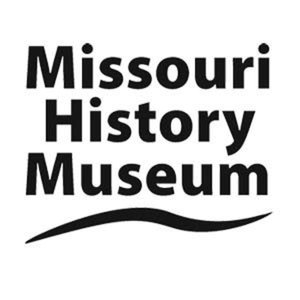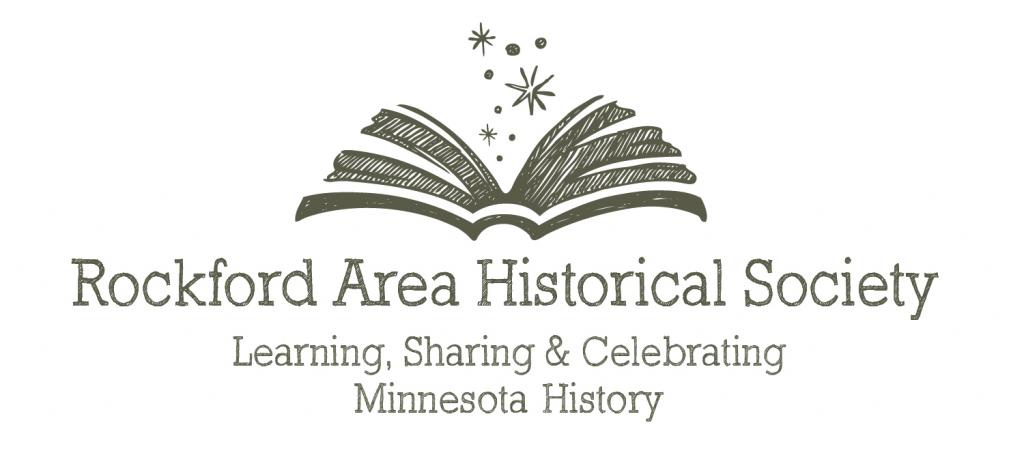from May. 1, 1865
Dedicated to the Memory of Abraham Lincoln
-
Full Title
Dedicated to the Memory of Abraham Lincoln...America's noblest sons are weeping
-
Description
Broadside reading "Dedicated to the Memory of Abraham Lincoln" including 8 lines of poetry beginning "America's noblest sons are weeping" copyright James Logan [Philadelphia].
-
Transcription
DEDICATED
TO THE
MEMORY OF
ABRAHAM LINCOLN
America’s noblest sons are weeping
Her daughters they are bathed in tears;
Abraham the Great has fallen---in
Nature’s sleep, the sleep of years.
Now he’s gone, we’ll not recall him
From a paradise of bliss----
Where he pleads the cause of Freedom
To a changing world like this.
Entered to Act of Congress in the year 1865 by James Logan, in the Clerk’s Office of the District Court for the Eastern District of Pennsylvania.
[Transcription by: Dr. Susan Corbesero, Ellis School, Pittsburgh, Pennsylvania] -
Source
Kislak Center for Special Collections, Rare Books and Manuscripts, University of Pennsylvania Libraries. Gordon Block Collection of Lincolniana, UPenn Ms. Coll. 941, Box 4 Folder 1
-
Rights
This item is in the Public Domain.
-
Tags
-
Cite this Item
Logan, James. "Dedicated to the Memory of Abraham Lincoln...America's noblest sons are weeping". Remembering Lincoln. Web. Accessed December 14, 2025. https://rememberinglincoln.fords.org/node/294
-
Creator
Logan, James
-
Date
1865
from May. 1, 1865
Dedicated to the Memory of Abraham Lincoln...America's noblest sons are weeping
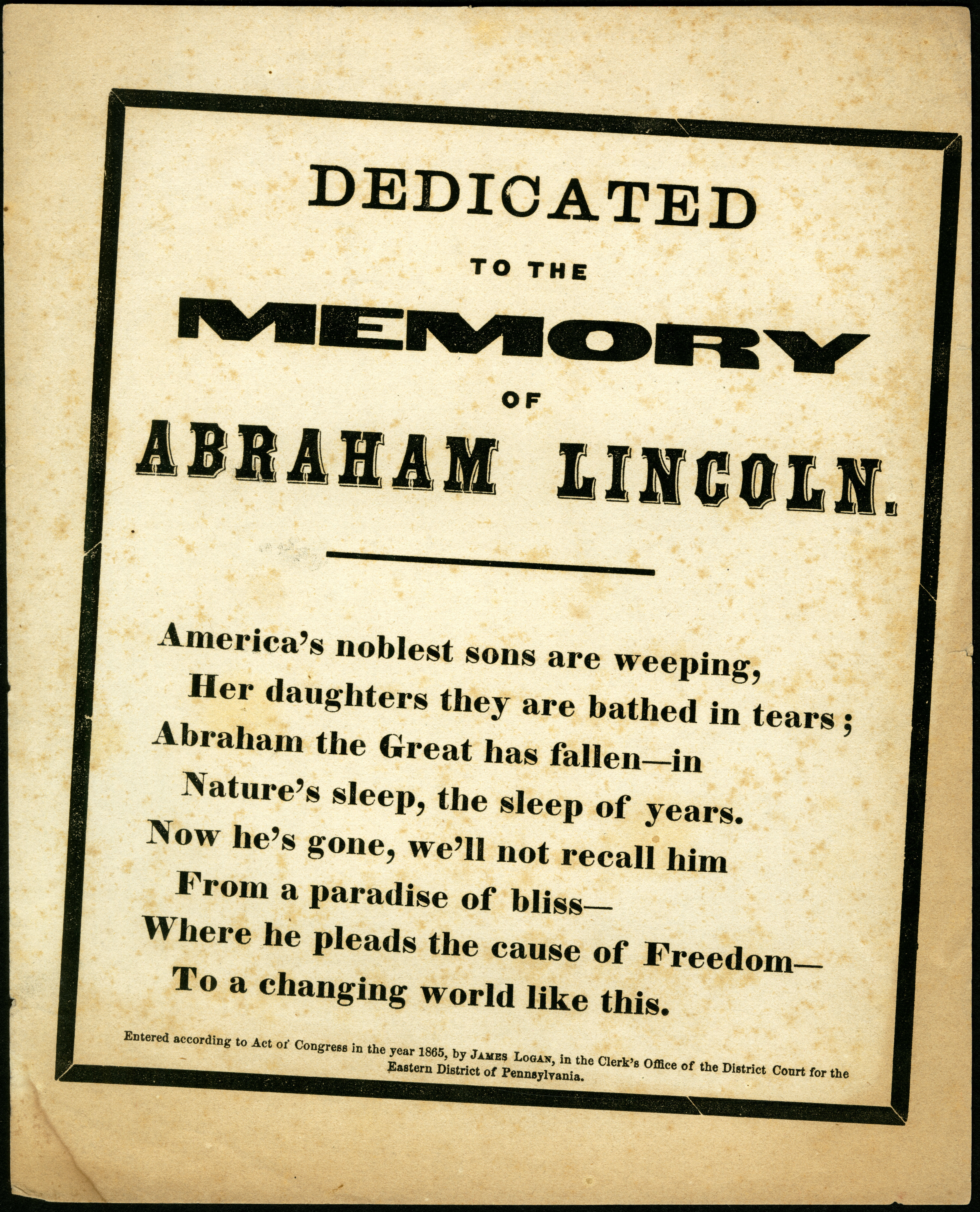
-
Description
Broadside reading "Dedicated to the Memory of Abraham Lincoln" including 8 lines of poetry beginning "America's noblest sons are weeping" copyright James Logan [Philadelphia].
-
Source
Kislak Center for Special Collections, Rare Books and Manuscripts, University of Pennsylvania Libraries. Gordon Block Collection of Lincolniana, UPenn Ms. Coll. 941, Box 4 Folder 1
-
Rights
This item is in the Public Domain.
-
Creator
Logan, James
-
Date
May 1, 1865
from Apr. 15, 1865
Bulletin Extra
-
Full Title
Issue of Bulletin EXTRA: "Lincoln and Seward and Fred Seward Assassinated!!", April 15, 1865
-
Source
Missouri History Museum
-
Rights
This item is in the public domain.
-
Tags
-
Cite this Item
Bulletin. "Issue of Bulletin EXTRA: "Lincoln and Seward and Fred Seward Assassinated!!", April 15, 1865". Remembering Lincoln. Web. Accessed December 14, 2025. https://rememberinglincoln.fords.org/node/322
from Apr. 15, 1865
Issue of Bulletin EXTRA: "Lincoln and Seward and Fred Seward Assassinated!!", April 15, 1865
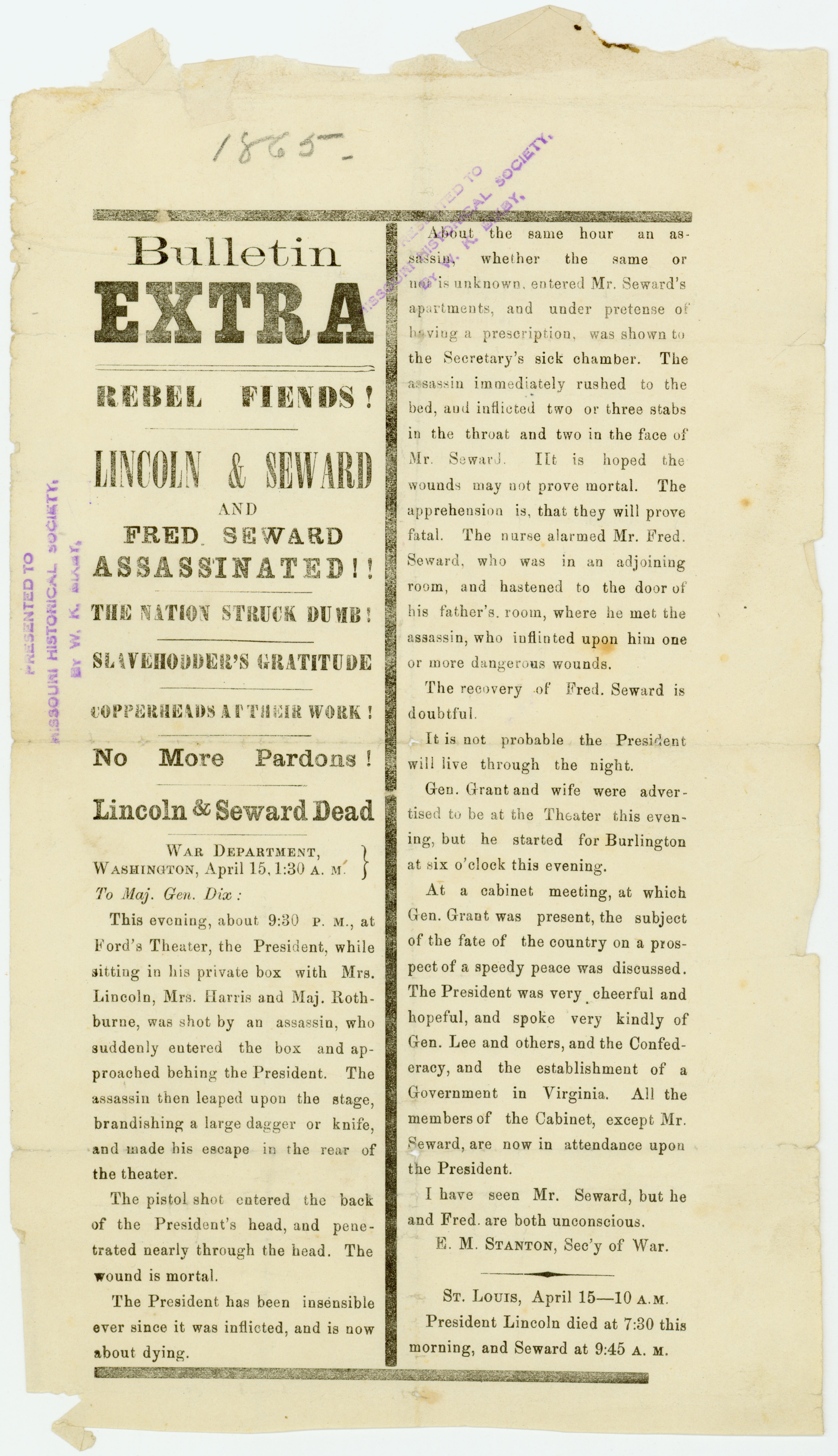
-
Source
Missouri History Museum
-
Rights
This item is in the public domain.
-
Creator
Bulletin
-
Date
April 15, 1865
from Apr. 15, 1865
Diary of William Ellis Stork, Volume 1, Preston, Minnesota
-
Full Title
Diary of William Ellis Stork, Volume 1, Preston, Minnesota
-
Description
Diary of William Ellis Stork as he recounts his life and his reactions to major events.
-
Transcription
"Got news of Lincoln’s death and the attempted assassination of Sen [??]" (pg. 30)
"1865 April 3. Richmond & Peters burg was evacuated by the rebels & taken possession of by our forces April 9th and 10th Gen[eral] Lee surrendered the army of north Virginia to Grant Lincoln died was shot at a Theatre April 14th & died April 15th. Born July 12th 1809 Age at death death 55 y[ea]rs 9 m[onths] 3 d[ays] 16 m[inutes] President of the United States [inked line] Andrew Johnson took the oath of office as President April 15th at 11 o’clock A.M. [inked line] J. Wilkes Booth & his accomplice Harrold the murderers of President Lincoln was found in a barn at a Mr Garrotts 3 Ms[miles] from Bowling Green towards Port Royal in Virginia Booth was shot in the barn & died at 7 A.M. April 26th Harrold was taken to Washington President Johnson in his Proclamation of May 2nd after stating It appears from evidence in the burden[?] of military justice that the atrocious murder of the late President & attempted murder of W[illiam] H. Seward secretary of State incited, concerted, of & between Jefferson Davis late of Richmond Va[Virginia] & Jacob Thompson Clement Clay Beverly Tucker George N. Danders W.C. Cleary & others rebels & traitors against the Government of the United States, Harbored in Canada now therefore to the end" (pg. 74)
-
Source
Minnesota Reflections
-
Rights
Use of this item for research, teaching, and private study is permitted with proper citation and attribution. Reproduction of this item for publication, broadcast, or commercial use requires written permission.
-
Tags
-
Cite this Item
Stork, William Ellis, 1841 - 1938. "Diary of William Ellis Stork, Volume 1, Preston, Minnesota". Remembering Lincoln. Web. Accessed December 14, 2025. https://rememberinglincoln.fords.org/node/319
from Apr. 15, 1865
Diary of William Ellis Stork, Volume 1, Preston, Minnesota
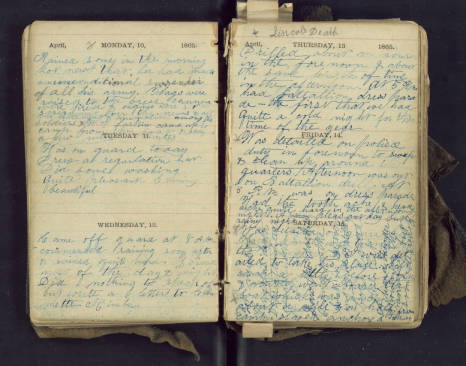
-
Description
Diary of William Ellis Stork as he recounts his life and his reactions to major events.
-
Source
Minnesota Reflections
-
Rights
Use of this item for research, teaching, and private study is permitted with proper citation and attribution. Reproduction of this item for publication, broadcast, or commercial use requires written permission.
-
Creator
Stork, William Ellis, 1841 - 1938
-
Date
April 15, 1865
from May. 4, 1865
Ellen Kean to Sol Smith
-
Full Title
Letter of Ellen Kean, New York, to Sol Smith, May 4, 1865
-
Description
Describes the funeral of Abraham Lincoln in detail.
-
Source
Missouri History Museum
-
Rights
This item is in the public domain.
-
Tags
-
Cite this Item
Kean, Ellen, 1805-1880. "Letter of Ellen Kean, New York, to Sol Smith, May 4, 1865". Remembering Lincoln. Web. Accessed December 14, 2025. https://rememberinglincoln.fords.org/node/315
from May. 4, 1865
Letter of Ellen Kean, New York, to Sol Smith, May 4, 1865
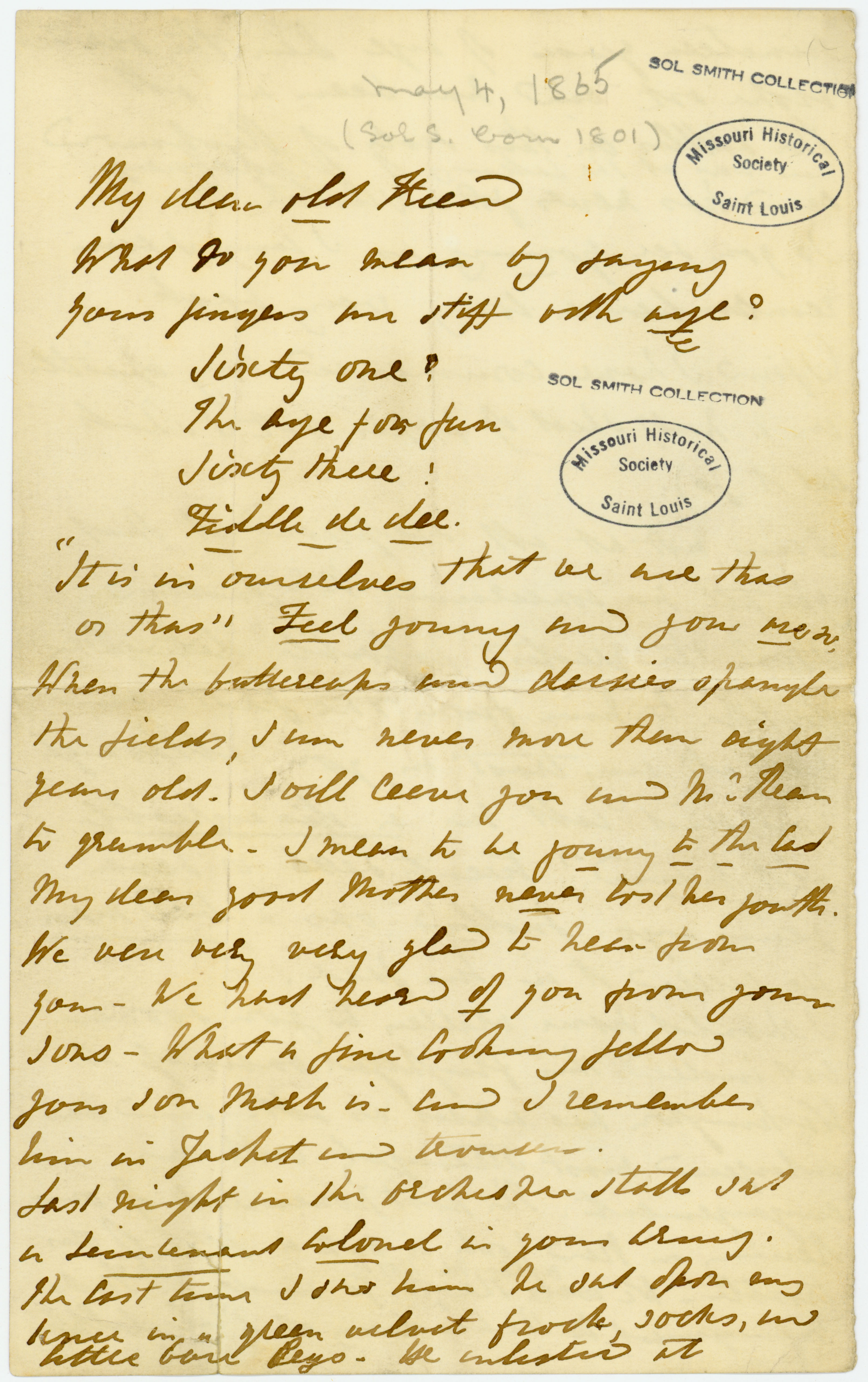
-
Description
Describes the funeral of Abraham Lincoln in detail.
-
Source
Missouri History Museum
-
Rights
This item is in the public domain.
-
Creator
Kean, Ellen, 1805-1880
-
Date
May 4, 1865
from Apr. 18, 1865
Mary Farren to Solomon F. Smith
-
Full Title
Letter of Mary [Mary Farren], New York, to Uncle Sol [Solomon F. Smith], April 18, 1865
-
Description
Gives her reaction to the assassination of President Abraham Lincoln. States, ". . . .I presume the horrible occurance of last Friday, has thrown a gloom over St. Louis, as everywhere else. I fear the measures were so well taken that the principal criminal will escape. What a dreadful calamity to befall his family. His poor old Mother, had he no human feeling left, that he could crush her in her declining years with such a blow. Edwin [Edwin Booth] it is said is perfectly prostrated. His career in all probability blighted forever. . . .By the way the name of Actor is not in much favor here at present. I was told the Detectives watch them pretty closely. . . ."
-
Source
Missouri History Museum
-
Rights
This item is in the public domain.
-
Tags
-
Cite this Item
Farren, Mary. "Letter of Mary [Mary Farren], New York, to Uncle Sol [Solomon F. Smith], April 18, 1865". Remembering Lincoln. Web. Accessed December 14, 2025. https://rememberinglincoln.fords.org/node/314
from Apr. 18, 1865
Letter of Mary [Mary Farren], New York, to Uncle Sol [Solomon F. Smith], April 18, 1865
![Letter of Mary [Mary Farren], New York, to Uncle Sol [Solomon F. Smith], April 18, 1865](https://rememberinglincoln.fords.org/sites/default/files/Mary%20Farren%20Letter%201.jpg)
-
Description
Gives her reaction to the assassination of President Abraham Lincoln. States, ". . . .I presume the horrible occurance of last Friday, has thrown a gloom over St. Louis, as everywhere else. I fear the measures were so well taken that the principal criminal will escape. What a dreadful calamity to befall his family. His poor old Mother, had he no human feeling left, that he could crush her in her declining years with such a blow. Edwin [Edwin Booth] it is said is perfectly prostrated. His career in all probability blighted forever. . . .By the way the name of Actor is not in much favor here at present. I was told the Detectives watch them pretty closely. . . ."
-
Source
Missouri History Museum
-
Rights
This item is in the public domain.
-
Creator
Farren, Mary
-
Date
April 18, 1865
from Apr. 14, 1865
Amos Madden Thayer Diary
-
Full Title
Diary of Amos Madden Thayer, March 29-May 12, 1865
-
Description
Amos Madden Thayer was born October 10, 1841, in Chautauqua County, New York. Soon after his graduation from college in 1862, he was commissioned 2nd lieutenant of Company D, 112th New York Infantry. He later transferred to the United States Signal Corps, where he served as 1st lieutenant until the close of the war. Following the war he moved to St. Louis, where he passed the bar and later spent several years as a judge. He died April 24, 1905, in St. Louis.
Includes brief accounts of movements and military operations during the Appomattox Campaign; account of march from Burneville, Virginia, to Washington, D.C.; and final messages that Thayer sent and received, which passed between Generals Meade and Humphreys on April 9, 1865, during the Battle of Sailor's Creek. Also includes letterbook of correspondence from Thayer's law practice in Saint Louis, 1866-1876.
-
Source
Missouri History Museum
-
Rights
This item is in the public domain.
-
Tags
-
Cite this Item
Thayer, Amos Madden, 1841-1905. "Diary of Amos Madden Thayer, March 29-May 12, 1865". Remembering Lincoln. Web. Accessed December 14, 2025. https://rememberinglincoln.fords.org/node/313
from Apr. 14, 1865
Diary of Amos Madden Thayer, March 29-May 12, 1865
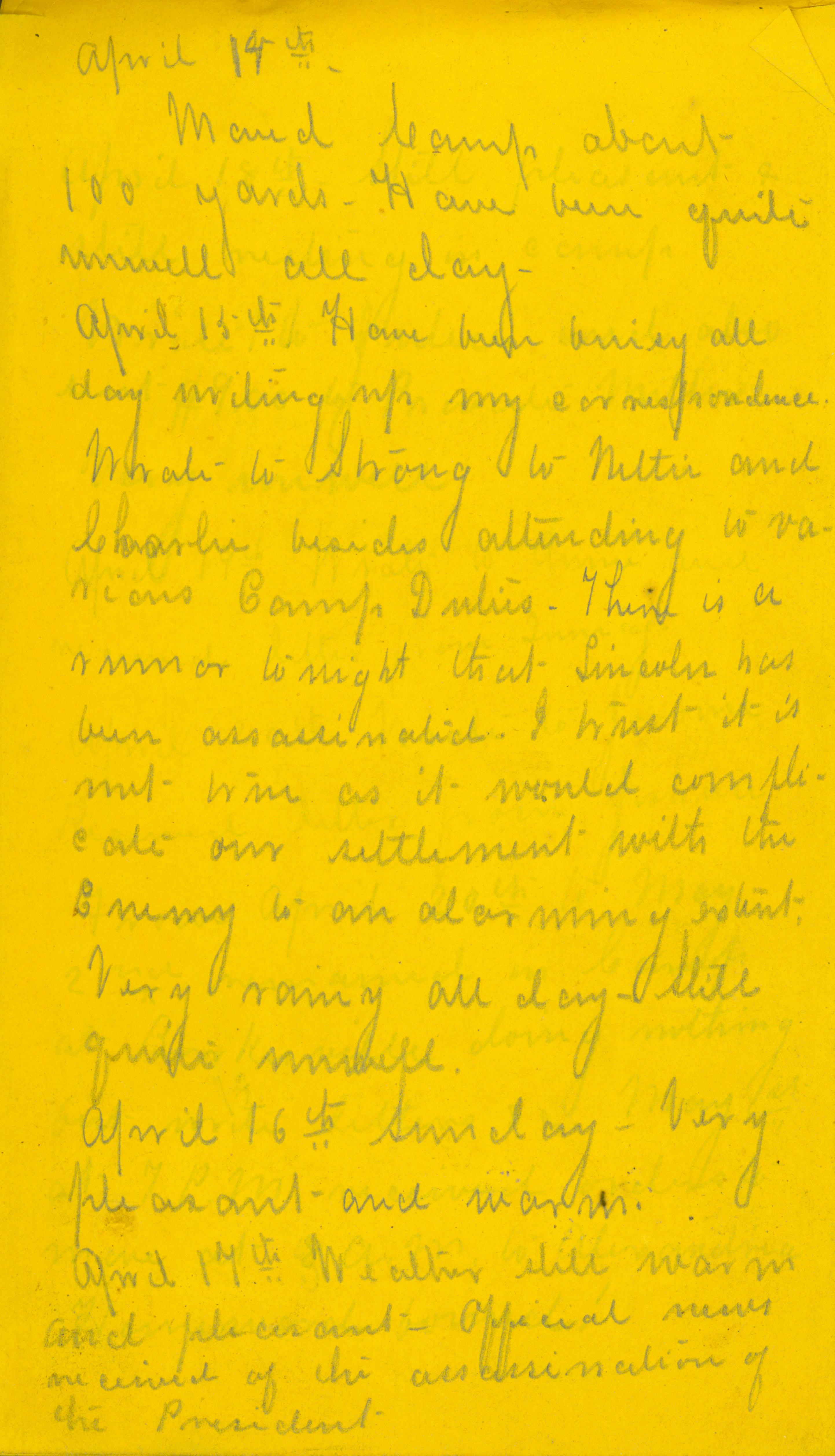
-
Description
Amos Madden Thayer was born October 10, 1841, in Chautauqua County, New York. Soon after his graduation from college in 1862, he was commissioned 2nd lieutenant of Company D, 112th New York Infantry. He later transferred to the United States Signal Corps, where he served as 1st lieutenant until the close of the war. Following the war he moved to St. Louis, where he passed the bar and later spent several years as a judge. He died April 24, 1905, in St. Louis.
Includes brief accounts of movements and military operations during the Appomattox Campaign; account of march from Burneville, Virginia, to Washington, D.C.; and final messages that Thayer sent and received, which passed between Generals Meade and Humphreys on April 9, 1865, during the Battle of Sailor's Creek. Also includes letterbook of correspondence from Thayer's law practice in Saint Louis, 1866-1876.
-
Source
Missouri History Museum
-
Rights
This item is in the public domain.
-
Creator
Thayer, Amos Madden, 1841-1905
-
Date
April 14, 1865
from May. 21, 1865
A.M. Black to Jane Black
-
Full Title
Letter of A. M. Black, Springfield, to Sister [Jane Black], May 21, 1865
-
Description
Describes a wreath he obtained from Abraham Lincoln's funeral for her. States, ". . . .I have got the Lincoln Wreath for you. Josephine got it from her mother Mrs. Edwards. It was made and placed on the Coffin in Chicago by Miss Arnold of that place she is a daughter of Congressman Arnold. . . .Strangers are making great efforts to get relics. . . .Josephine is to have enough of Mr. Lincoln's hair to fill a small locket. . . ."
-
Source
Missouri History Museum
-
Rights
This item is in the public domain.
-
Tags
-
Cite this Item
Black, Alexander M.. "Letter of A. M. Black, Springfield, to Sister [Jane Black], May 21, 1865". Remembering Lincoln. Web. Accessed December 14, 2025. https://rememberinglincoln.fords.org/node/312
from May. 21, 1865
Letter of A. M. Black, Springfield, to Sister [Jane Black], May 21, 1865
![Letter of A. M. Black, Springfield, to Sister [Jane Black], May 21, 1865](https://rememberinglincoln.fords.org/sites/default/files/A.M.%20Black%20Letter%201.jpg)
-
Description
Describes a wreath he obtained from Abraham Lincoln's funeral for her. States, ". . . .I have got the Lincoln Wreath for you. Josephine got it from her mother Mrs. Edwards. It was made and placed on the Coffin in Chicago by Miss Arnold of that place she is a daughter of Congressman Arnold. . . .Strangers are making great efforts to get relics. . . .Josephine is to have enough of Mr. Lincoln's hair to fill a small locket. . . ."
-
Source
Missouri History Museum
-
Rights
This item is in the public domain.
-
Creator
Black, Alexander M.
-
Date
May 21, 1865
from May. 4, 1865
E. Rothesay Miller to Theodore Freeley Gale
-
Full Title
Letter of E. Rothesay Miller, "The Monastery," Princeton, to Free [Theodore Freeley Gale], May 4, 1865
-
Description
Regarding his education at Princeton and Abraham Lincoln's body passing through Philadelphia after the assassination. States, ". . . .I was at home for about a week's vacation at the time that our President's body was taken through Philadelphia. I went down Friday afternoon: there was to have been a grand illumination — procession on Monday. The first thing that I heard Saturday Morning before I was dressed was that Lincoln had been murdered. It could hardly be believed. I expected to go see the body Sunday afternoon but my brother — Mr. Hall. . . .started right after breakfast — after three hours hard work got as far as 6th — Chestnut (It was in the State House on Chestnut below 5th.) They were on the corner for an hour — then concluded that they might as well give up. The crowd was so dense that the crystal of my brother's watch was broken (a heavy hunting case). He said every once in a while some woman would faint — she would be passed out over the heads of the crowd. . . ."
-
Source
Missouri History Museum
-
Rights
This item is in the public domain.
-
Tags
-
Cite this Item
Miller, Edward Rothesay. "Letter of E. Rothesay Miller, "The Monastery," Princeton, to Free [Theodore Freeley Gale], May 4, 1865". Remembering Lincoln. Web. Accessed December 14, 2025. https://rememberinglincoln.fords.org/node/311
from May. 4, 1865
Letter of E. Rothesay Miller, "The Monastery," Princeton, to Free [Theodore Freeley Gale], May 4, 1865
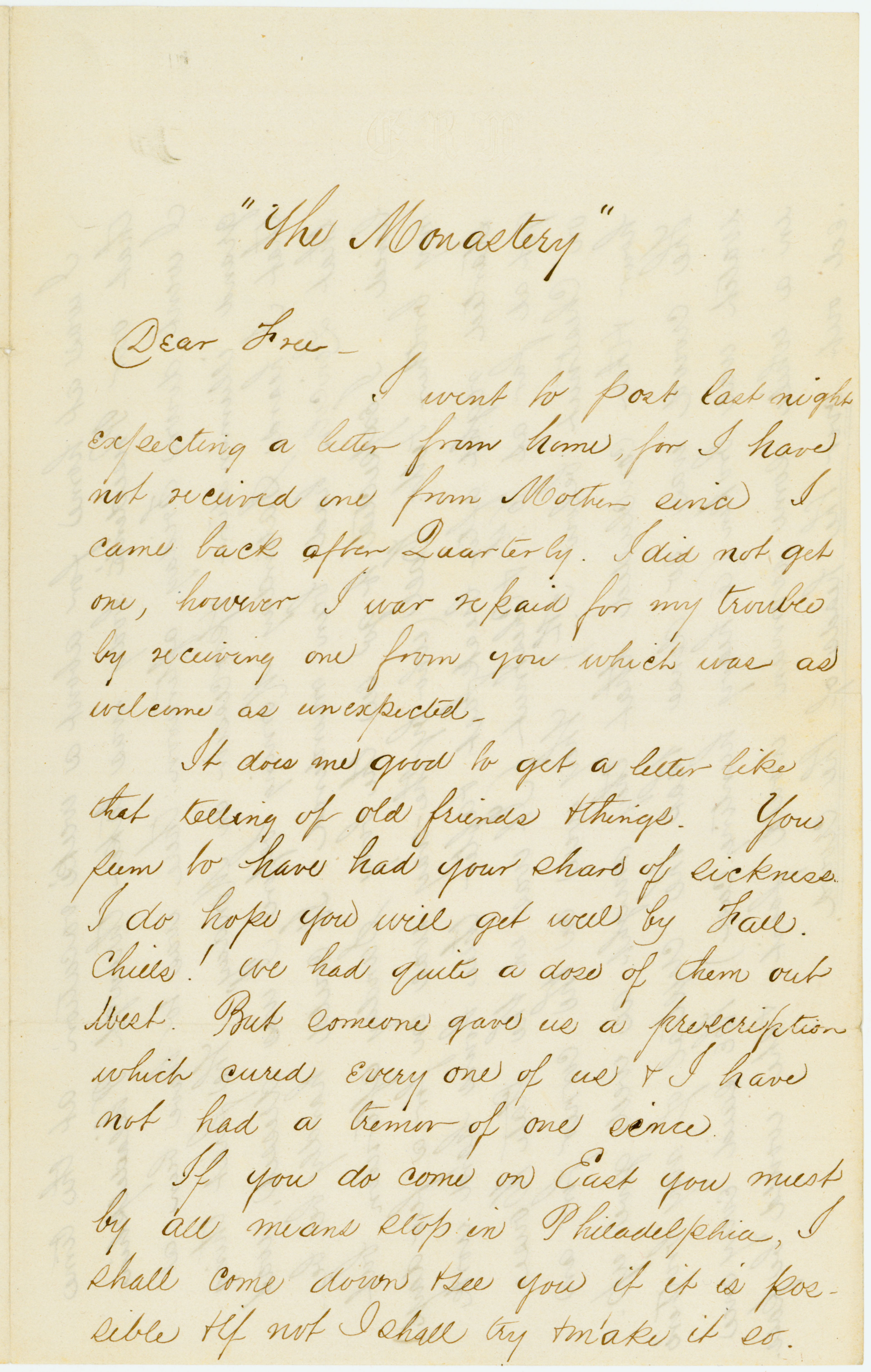
-
Description
Regarding his education at Princeton and Abraham Lincoln's body passing through Philadelphia after the assassination. States, ". . . .I was at home for about a week's vacation at the time that our President's body was taken through Philadelphia. I went down Friday afternoon: there was to have been a grand illumination — procession on Monday. The first thing that I heard Saturday Morning before I was dressed was that Lincoln had been murdered. It could hardly be believed. I expected to go see the body Sunday afternoon but my brother — Mr. Hall. . . .started right after breakfast — after three hours hard work got as far as 6th — Chestnut (It was in the State House on Chestnut below 5th.) They were on the corner for an hour — then concluded that they might as well give up. The crowd was so dense that the crystal of my brother's watch was broken (a heavy hunting case). He said every once in a while some woman would faint — she would be passed out over the heads of the crowd. . . ."
-
Source
Missouri History Museum
-
Rights
This item is in the public domain.
-
Creator
Miller, Edward Rothesay
-
Date
May 4, 1865
from Apr. 21, 1865
Nellie Blow to Minerva Blow
-
Full Title
Partial letter of Nellie Blow, New York, to Dearest Mother [Minerva Blow], April 21, 1865
-
Description
Regarding the prevailing gloom and sadness in the city due to the death of President Lincoln. States that Miss Haines took her out riding on the day of the funeral train. End of letter missing.
-
Source
Missouri History Museum
-
Rights
This item is in the public domain.
-
Tags
-
Cite this Item
Blow, Nellie. "Partial letter of Nellie Blow, New York, to Dearest Mother [Minerva Blow], April 21, 1865". Remembering Lincoln. Web. Accessed December 14, 2025. https://rememberinglincoln.fords.org/node/308
from Apr. 21, 1865
Partial letter of Nellie Blow, New York, to Dearest Mother [Minerva Blow], April 21, 1865
![Partial letter of Nellie Blow, New York, to Dearest Mother [Minerva Blow], April 21, 1865](https://rememberinglincoln.fords.org/sites/default/files/Nellie%20Blow%20Letter%201.jpg)
-
Description
Regarding the prevailing gloom and sadness in the city due to the death of President Lincoln. States that Miss Haines took her out riding on the day of the funeral train. End of letter missing.
-
Source
Missouri History Museum
-
Rights
This item is in the public domain.
-
Creator
Blow, Nellie
-
Date
April 21, 1865
from Apr. 17, 1865
Moses Many Lightning Face to S.R. Riggs
-
Full Title
Letter from Moses Many Lightning Face to S. R. Riggs from Davenport, Iowa
-
Description
After the hanging of 38 Dakota warriors in Mankato, Minnesota in the aftermath of the U.S.-Dakota War, the other 270 Dakota men who had been sentenced but not hung were sent to a prison camp in Davenport, Iowa. This is where they heard the rumor of President Lincoln's assassination. Moses Many Lightning Face, one of the prisoners, sent this letter to missionary Stephen Riggs asking if the rumor was true. It was recently translated from the Dakota by Dr. Clifford Canku/Mato Watakpe and published in the book The Dakota Prisoner of War Letters; the original is in the Collection of the Minnesota Historical Society.
-
Transcription
Davenport, Iowa April 17, 1865
S.R. Riggs
Well, my relative, I wish to write you a letter, we have heard news. They have said that the President [Abraham Lincoln] was killed. But someone of authority should tell us if this is not true. Thus, my relative, I write to you this letter. Also, I have heard several rumors, therefore, I want to write you this letter – it is so. The President has compassion for us, as so far we are still alive, but now they told us he was killed, and we are saddened. Those of us here think if this is so, we are heartbroken. Perhaps the attitude of the cavalry soldiers may change toward us. Tell me what your thoughts are, I want to know, that’s why I write to you. Then I wish to hear exactly how they killed the President. Then, also on Sundays when I am able, I do the preaching to them. That is all I’m going to say, I shake all your hands.
Moses Many Lightning Face This is me
-
Source
Minnesota Historical Society
-
Rights
Use of this item for research, teaching, and private study is permitted with proper citation and attribution, as Joseph A. Wheelock and family papers, Minnesota Historical Society. Reproduction of this item for publication, broadcast, or commercial use requires written permission. For permission, please see this web page.
-
Tags
-
Cite this Item
Moses Many Lightning Face and Clifford Canku/Mato Watakpe. "Letter from Moses Many Lightning Face to S. R. Riggs from Davenport, Iowa". Remembering Lincoln. Web. Accessed December 14, 2025. https://rememberinglincoln.fords.org/node/300
from Apr. 17, 1865
Letter from Moses Many Lightning Face to S. R. Riggs from Davenport, Iowa
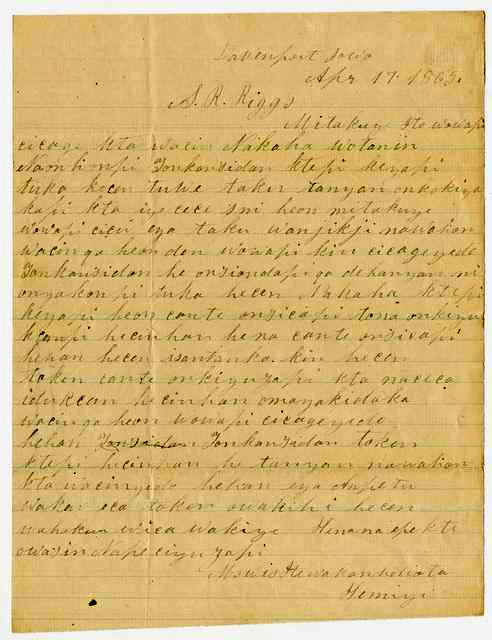
-
Description
After the hanging of 38 Dakota warriors in Mankato, Minnesota in the aftermath of the U.S.-Dakota War, the other 270 Dakota men who had been sentenced but not hung were sent to a prison camp in Davenport, Iowa. This is where they heard the rumor of President Lincoln's assassination. Moses Many Lightning Face, one of the prisoners, sent this letter to missionary Stephen Riggs asking if the rumor was true. It was recently translated from the Dakota by Dr. Clifford Canku/Mato Watakpe and published in the book The Dakota Prisoner of War Letters; the original is in the Collection of the Minnesota Historical Society.
-
Source
Minnesota Historical Society
-
Rights
Use of this item for research, teaching, and private study is permitted with proper citation and attribution, as Joseph A. Wheelock and family papers, Minnesota Historical Society. Reproduction of this item for publication, broadcast, or commercial use requires written permission. For permission, please see this web page.
-
Creator
Moses Many Lightning Face and Clifford Canku/Mato Watakpe
-
Date
April 17, 1865
